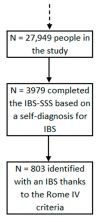Fermentable Oligo-, Di-, and Mono-Saccharides and Polyols (FODMAPs) Consumption and Irritable Bowel Syndrome in the French NutriNet-Santé Cohort
- PMID: 34960065
- PMCID: PMC8707099
- DOI: 10.3390/nu13124513
Fermentable Oligo-, Di-, and Mono-Saccharides and Polyols (FODMAPs) Consumption and Irritable Bowel Syndrome in the French NutriNet-Santé Cohort
Abstract
(1) Background: Specific foods, and more particularly, fermentable oligo-, di-, and mono-saccharides and polyols (FODMAPs) are often considered as triggers of digestive symptoms in Irritable Bowel Syndrome (IBS). Our aim was to study FODMAP consumption in controls and IBS participants in a large French population-based cohort; (2) Methods: Participants from the NutriNet-Santé cohort study completed the Rome IV and IBS-SSS questionnaire in a cross sectional study. Among them, 27,949 eligible participants had previously completed three 24-h recalls as well as anthropometrics, socio-demographical and lifestyle data. Total FODMAP intake (in g/day) was computed using a specific composition table. The association between FODMAPs and IBS was estimated through multivariable logistic regression models; (3) Results: Included participants were mainly women (75.4%) and the mean age was 43.4 ± 14.1 years. FODMAPs accounted for a mean daily intake of 19.4 ± 9.5 g/day. Overall 1295 participants (4.6%) were identified with an IBS. After adjusting for confounding factors, IBS participants had lower intakes in FODMAPs than non-IBS ones (aOR: 0.88, 95% CI: 0.82-0.95, p-value: 0.001). IBS severity was associated with more frequent low FODMAP intakes (<9 g/day); (4) Conclusions: Participants tended to consume 19 g of FODMAPs per day, but slightly less for IBS participants than for controls. In IBS participants, higher severity was associated with lower intakes.
Keywords: FODMAP intake; IBS; Nutrinet-Santé cohort study; Rome IV criteria; cross-sectional study.
Conflict of interest statement
The authors declare no conflict of interest. The funders had no role in the design of the study; in the collection, analyses, or interpretation of data; in the writing of the manuscript, or in the decision to publish the results.
Figures



References
MeSH terms
Substances
Grants and funding
LinkOut - more resources
Full Text Sources

